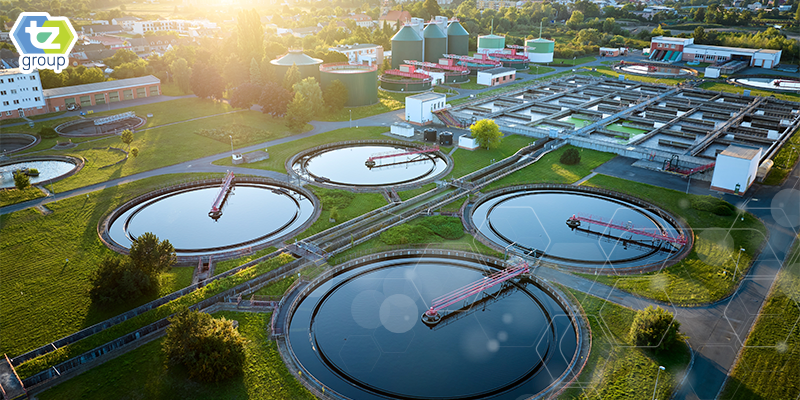To counter climate change in today’s world, the need for sustainable water treatment practices has never been more pressing, and organic phosphonates have a key role in this process, offering numerous benefits for preventing scaling, corrosion, and fouling.
However, the increasing use of these compounds raises questions about their long-term environmental impact and regulatory compliance. Organic phosphonates are not easily broken down in nature, they’re stable and can persist in water bodies, potentially accumulating and disrupting aquatic ecosystems, but they can lower energy consumption in water treatment systems, contributing to sustainability. In this blog, we’ll tell you all about them.
What Are Organic Phosphonates?
Organic phosphonates are organophosphorus compounds characterized by carbon-to-phosphorus (C–P) bonds. This bond provides them with exceptional stability, making them perfect for water treatment processes. Their resilience against hydrolysis, even in extreme conditions, makes them ideal for industrial applications.
These phosphonates work by binding to metal ions such as calcium, iron, and magnesium, preventing these ions from precipitating out of the water and forming scale. They are also widely used as corrosion inhibitors by creating a protective layer on metal surfaces, thus minimizing contact with corrosive substances.
There are various types of organic phosphonates used in specific industrial contexts based on their performance in controlling mineral precipitation, protecting equipment, and maintaining water system efficiency. These include:
- ATMP: Aminotrimethylene phosphonic acid is used primarily in cooling water systems.
- EDTMP: Ethylenediamine tetra methylene phosphonic acid is popular in desalination and large-scale water systems.
- HEDP: Hydroxyethylidene diphosphonic acid is known for its dual properties of scaling and corrosion prevention.
Regulatory Compliance
The use of organic phosphonates in water treatment is governed by various regulatory frameworks that ensure safe application and environmental stewardship. In the United States, the Environmental Protection Agency (EPA) monitors the discharge of phosphonates under the Clean Water Act. Industries must comply with strict guidelines on chemical disposal to avoid environmental contamination.
Compliance with these regulations not only ensures environmental protection, but also protects businesses from potential fines and operational disruptions.
The Role of Organic Phosphonates in Water Treatment
Scale Prevention
A key use of organic phosphonates in water treatment is to serve as scale inhibitors. Scaling can severely affect the efficiency of water treatment systems by clogging pipes, fouling heat exchangers, and damaging critical equipment. They help in stopping minerals like calcium carbonate from crystallizing, making things run more smoothly and cutting down on maintenance work.
Corrosion Inhibition
Corrosion is a big issue in water treatment, particularly in setups where metal parts come into contact with different water chemistries. Organic phosphonates act as corrosion inhibitors by forming a protective film on metal surfaces, shielding them from corrosive agents such as oxygen and salts. This prolongs the lifespan of industrial infrastructure and cuts down on the need for expensive repairs or replacements.
Biofouling Control
Biofouling, the accumulation of microorganisms in water systems, is another critical area where organic phosphonates play a vital role. By preventing the adhesion of bacteria and algae to surfaces, phosphonates reduce the growth of biofilms. This not only ensures better water quality but also minimizes the need for additional, more aggressive chemical treatments.
Advantages of Using Organic Phosphonates
Lower Chemical Use
They’re a sustainable option due to their efficiency at low concentrations. Their ability to perform effectively in water treatment systems without the need for large quantities of chemicals contributes to reduced overall chemical use.
However, it’s crucial to balance their use with the development of effective removal technologies to mitigate their environmental footprint. Studies have shown that while organic phosphonates are generally non-toxic to humans at the concentrations used in water treatment, their biodegradability in the environment is slow, raising concerns about potential ecological effects.
One promising method is the use of UV treatment combined with Fe(III) co-precipitation, which has shown high efficacy in breaking down phosphonates in wastewater streams. Another emerging technology is membrane-based filtration, which can capture phosphonates from wastewater before discharge. This method is particularly useful in industrial settings where phosphonates are used in large volumes.
Energy and Cost Efficiency
By preventing scaling, corrosion, and biofouling, organic phosphonates contribute to significant energy savings. Systems dealing with these problems usually need extra energy to keep the water flowing and the heat exchange going, plus they often require regular maintenance. Phosphonates help extend the lifespan of equipment and reduce operational disruptions, making them a cost-effective solution for industries.
Real-World Applications
Desalination Plants
Desalination plants, particularly those in regions facing water scarcity, rely on organic phosphonates to prevent scale formation on membranes used in reverse osmosis systems. By controlling scale, these plants can operate at higher efficiencies and lower costs.
Cape Town, South Africa, has implemented innovative policies to combat water scarcity and promote sustainable management. In response to a severe drought, the city enforced strict water restrictions and invested in infrastructure projects like desalination plants and water recycling systems to diversify its water sources.
Power Plant Cooling Systems
In power plants, cooling systems must remain free from scale and corrosion to maintain high levels of energy efficiency. Organic phosphonates have been used successfully in these systems, like in Grey Water Pond at Palo Verde, Arizona, to reduce scaling and corrosion, leading to reduced energy consumption and extended equipment lifespans.
Municipal Water Treatment
Municipal water systems, especially in areas with hard water, have benefited from using organic phosphonates to maintain clean and efficient distribution networks. By preventing the formation of scale in pipelines, municipalities can ensure uninterrupted water flow and reduce maintenance costs. The European Environment Agency in countries like Spain, France or the Netherlands, set treatment standards to protect the water environment, by reducing the amounts of nutrients and organic matter being discharged.
Comparison with Alternative Chemicals
When compared to other water treatment chemicals such as polyphosphates or inorganic inhibitors, organic phosphonates offer a superior performance in terms of both scale prevention and corrosion inhibition. Polyphosphates tend to break down into orthophosphates, which can lead to nutrient loading in water bodies and cause algal blooms, an environmental concern not typically associated with phosphonates.
While inorganic inhibitors are less costly, they are also less effective in harsh water conditions, such as high temperatures or variable pH levels, where organic phosphonates maintain stability. This makes phosphonates the preferred choice in more challenging industrial water systems.
Additionally, phosphonates are more effective at lower concentrations, meaning less chemical is required to achieve the same result, leading to reduced environmental impact and operational costs.
Join the Movement Towards Sustainable Water Treatment with TZ Group
Organic phosphonates are invaluable in promoting sustainable water treatment practices across industries. From preventing scaling and corrosion to improving energy efficiency and extending the lifespan of industrial equipment, their benefits are clear. Research is ongoing to develop biodegradable alternatives to traditional organic phosphonates. Further advancements in removal technologies, such as electrodialysis and microbial fuel cells, are being developed to target not only phosphonates but also other persistent chemicals in wastewater.
Whether your industry requires chemical solutions for cooling towers, desalination plants, municipal water systems and more, organic phosphonates can provide the sustainability and efficiency you need. TZ Group is your reliable partner in sourcing these essential chemicals. We are committed to supplying high-quality organic phosphonates that meet your water treatment needs. Contact us today to learn more about how we can help you develop your next project using the best practices and highest quality standards.


